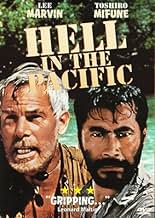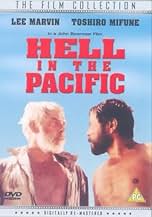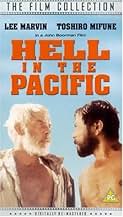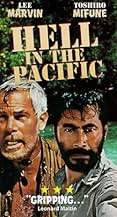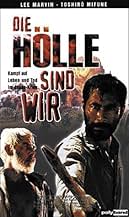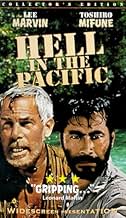Füge eine Handlung in deiner Sprache hinzuDuring World War II, an American pilot and a marooned Japanese navy captain are deserted on a small uninhabited island in the Pacific Ocean. There, they must cease their hostility and cooper... Alles lesenDuring World War II, an American pilot and a marooned Japanese navy captain are deserted on a small uninhabited island in the Pacific Ocean. There, they must cease their hostility and cooperate if they want to survive, but will they?During World War II, an American pilot and a marooned Japanese navy captain are deserted on a small uninhabited island in the Pacific Ocean. There, they must cease their hostility and cooperate if they want to survive, but will they?
- Regie
- Drehbuch
- Hauptbesetzung
- Auszeichnungen
- 1 Gewinn & 2 Nominierungen insgesamt
- Captain Tsuruhiko Kuroda
- (as Toshiro Mifune)
Empfohlene Bewertungen
This is a rare work of film that uses two actors, limited dialog(half of it in Japanese), and only one location. There have been many attempts at making movies about people stranded on islands, but this one pulls it off in a way no other has.
Thsi is a film about not only survival, but overcoming prejudice towards ones sworn enemy in a time of war. It is about moving past the fears of what you do not know, and using what you do know and the basic need to survive to pull through and band together.
I was more enthralled by this movie with almost no dialog, than I have been with movies that have won screenplay Oscars. To me, this is an example that if you have the right actors, the right story, and the right setting, dialog is not always necessary.
One outstanding feature of this film is that it is in both Japanese and English, intentionally without sub-titles. An American or Japanese audience could watch this film and appreciate its message. This duality serves to heighten the cultural differences between the two men, and it is cultural bias that is the true enemy.
Buy it, it's a keeper!
"Hell in the Pacific" is a good movie about how struggle to survive supersedes any other feelings even in times of war. The Japanese and the American soldiers find how pointless is their fight and resolve their situation joining forces and learning to accept and respect their culture differences despite the language barrier and warfare. Surprisingly they also become friends but the abrupt conclusion is too stupid and meaningless, apparently imposed by the studio. The alternate ending is also terrible but better then the original one. In 1985, Wolfgang Petersen used the same idea in a futuristic environment in "Enemy Mine". My vote is seven.
Title (Brazil): "Inferno no Pacífico" ("Hell in the Pacific")
This is not Cast Away Meets WWII. For one thing, it has a much tighter focus, completely losing anything beyond the island's horizon. It is admirable in its bloody-minded focus, and, with only two actors to cast, it's hard to imagine how it could have been any more perfect that pitching wild-man extraordinaire Lee Marvin opposite Kurosawa favorite Toshiro Mifune. A genius idea, but one that could have failed with a more conventional approach.
We are introduced to both antagonists in a neutral way, free to prefer which ever one we choose, though that is hardly the point, and director John Boorman makes it both easy and at times hard to sympathise with either in equal measure. Both actors do a fine job, playing mostly emotional and physical roles with great restrain and intelligence.
Boorman's direction is perfect, rejecting excess stylization in favor of a subtle approach, aided by superb photography. You have got to see this at least once, simply because, for all its visceral thrills, it is quite profound without ever trying to be. Because it boasts top performances from two of the last century's greatest leading presences in action cinema. Because, though frustrating at first, the ending is, for once, the smartest one that could have been chosen. Humanity is on trial and the judges choose to be honest and pragmatic, thus delivering something that combines greatness and very thoughtful substance.
We need more films like this!
If you are one of the producers responsible for this theatrical release ending and are somehow still alive and reading this I can only ask WTF were you smoking? We invested two hours into the relationship between Marvin & Mifune for that??? It may be the worst ending I've ever witnessed in a decent movie. On the bright side for you, I may keep the blu ray for that reason alone!
Wusstest du schon
- WissenswertesBoth Lee Marvin and Toshirô Mifune actually served in the Pacific during World War II, of course on opposing sides. Marvin was a US Marine. He was wounded during the war and received the Purple Heart during the Battle of Saipan in 1944. Mifune served in the Imperial Japanese Army Air Service.
- PatzerLee Marvin was 44 at the time of filming, as evident by his gray hair. Toshiro Mifune's character also calls him an "old man" several times. WWII US Navy pilots Thus, he looks much too old for an actual WWII US Navy pilot, who were mostly in their twenties or early thirties.
- Zitate
American Pilot: Oh, for a second I thought you were a Jap.
- Alternative VersionenAmerican version featured an alternative ending where the two get drunk and walk off in separate directions arguing at each other; in the British version (which was exactly the same as the Japanese version), they start yelling and a bomb from the sky falls and blows everything apart.
- VerbindungenFeatured in Hollywood Remembers Lee Marvin (2000)
Top-Auswahl
- How long is Hell in the Pacific?Powered by Alexa
Details
Box Office
- Budget
- 4.150.000 $ (geschätzt)
- Laufzeit
- 1 Std. 43 Min.(103 min)
- Seitenverhältnis
- 2.35 : 1


